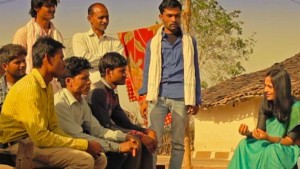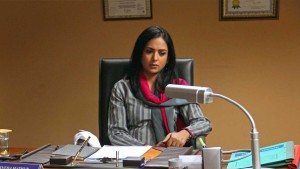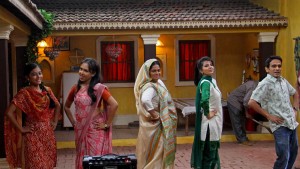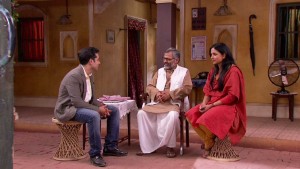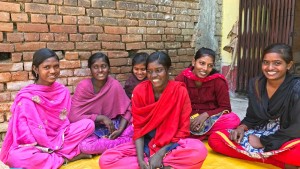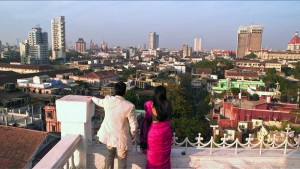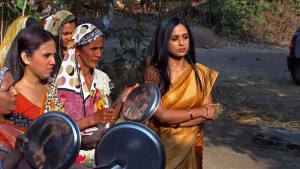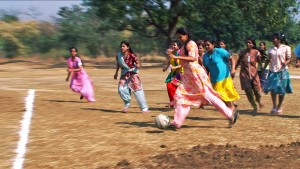Men of Chhatarpur
For ages, men have kept their egos safe and hidden under the idea that masculinity resides in their forearms and is only as strong as the fear in a woman’s mind. But definitions are a flowing stream, they take shape, however, time demands of them. I entered Salayyai Village of Chhatarpur with a rapid heartbeat, anxious as if I was about to get the results for an exam I had prepared for months; but my nervousness transformed into pride and hope when jingles on family planning reached my ears. The men of Chhatarpur, I found, were not to be confined within the rigid definitions of masculinity.
I heard the men of Salayyai tell me how they grew up in houses where domestic violence was nothing out of the ordinary, so when they got married, their wives became victims of their anger. Beating women out of irritation or sometimes in a drunken daze and forcing them to stay within the threshold was expected from these men. The women of Chhatarpur have no option but to spend hours in the dreary company of chulhas and firewood in MP’s swirling heat and lose count of the children they bear as no one considers family planning.
These men had fallen into the pit of archaic behaviour out of ignorance and lack of education. It was overwhelming to hear that our TV show Main Kuch Bhi Kar Sakti Hoon that brought about change in my fictional village of Pratappur, also encouraged some young men in Chhatarpur to bring about change in this small hamlet. One of the group, Raju, pointed out how the episode of Seema losing her life to an untimely and unsafe abortion struck a chord in him and perhaps many others.
Today these men understand the need to respect their wives’ wishes in having a child before they make decisions to expand their families. Birth control measures and vasectomy are no longer taboo in this village because the men of Chhatarpur realise how these small investments can make a palpable impact on their lives. From taking care of the children to grinding Masalas when the women sit back and take some much-deserved rest – the men of Chhatarpur do it all because they realise that households are happy when partners act as equals.
Women are no longer confined to their houses; once every month the women go out and indulge in whatever pleases their hearts. They hold equal if not a greater say in important decisions about the family’s future. And most importantly, they are the ones who decide what happens with their bodies.
The men of Chhatarpur are a testament to the idea that masculinity is never endangered by compassion and equality, and it resides not in flexed muscles but in the heart. The men of Chhatarpur will not have to write history for it to be kind to them, because virtue and kindness are the greatest weapons known to humanity, and history is kind to those who use them.
Let me Escape the Shackles of Patriarchy
When I was a child, my mother affectionately called me “Beta”. The term of endearment came from a place of so much warmth and love that I used to relish in the sweetness of the word. But even in my childlike curiosity I never questioned why my mother turned to the Hindi word for son to shower me with affection. Patriarchy is so deeply ingrained into our beings that sometimes we fail to recognise its very presence. It’s the norm even for the well-educated.
Men in our society have always been taught that they are the superior sex, and this line of thought is more prevalent when you are in rural areas. They have the upper hand in everything; from husbands eating before their wives do, to a man’s opinions having more weight than that of a woman. For long men across countries, across social and economic classes assumed right over everything, even on a woman’s body.
Mamta became a victim in the hands of one such man, who had such an enormous sense of entitlement that he couldn’t take no from a girl. What happened next was sad, but certainly not unheard of. Ramesh drugged Mamta, his own girlfriend, and raped her. When she got pregnant, Ramesh dragged her to a self-proclaimed godman going by the name of Baba Pehalwan, who carried out an unsafe abortion on her. The young girl was brought to Maanavta hospital suffering complications from a botched abortion. Mamta’s parents, already distressed by the position their daughter was in, were further blackmailed by the fraud Baba to take her home or they would face severe repercussions. Ignorance and fear moved them to act as they reached the hospital to take Mamta home. I had a hard time digesting yet another ugly reality of Pratappur but had to talk to her parents and make them realise the complications that came with an adolescent undergoing an abortion.
For Mamta, the trauma was so immense that for once she decided to take matters into her own hands and simply end her life. Her attempt at suicide was thankfully unsuccessful, but it gave me a peek into what must have been going on inside the innocent soul’s mind. Drugged, raped, and forced into an abortion by a boy she probably put her faith in. All because this boy grew up thinking he had the privilege of having any woman he desired. That a girl’s no does not matter, because women’s opinions hardly ever matter. How hard can it be for us to understand two simple things-- we were all born equal, and a person’s right to live life on their own terms does not reside in their body!
A Second Chance at Happiness
I have always been a firm believer of the idea that showing sympathy and wearing your heart on your sleeves takes a great deal of courage. Niceness is so often mistaken for weakness that this ruthless world leaves no chance to exploit those who are too polite. Naturally, people retreat. They build walls and put on a mask to make the world believe that their heart has hardened and they do not feel any pain.
Sometimes though, it piles up, as in the case of my Buaji. What does a woman who was married off and widowed, all by the age of eight do? Clad in a white saree, Buaji was denied the affections of a husband and the unparalleled joy of motherhood. To ask for a second chance at life? Unthinkable. Once widowed, a woman in rural India has no right to fall in love, no matter how many years go by. The world had not shown her any kindness in first robbing her of her childhood and then of her right to love and be loved. Why would this woman risk being kind to the world ever again? She cocooned herself in what she felt was her safe place, where there was no room for tears or sympathy. As she grew older she earned the reputation of being a hard woman with a sharp tongue, who was set in her ways of life. Buaji’s luck had worked for her in one place though; she was born into a family that accepted her after her childhood tragedies, treated her with the utmost respect, and did not discriminate based on her marital status.
In a turn of events that is almost unheard of in Pratappur, Buaji even found her second chance at life when her friendship with Subhashji turned into infatuation. But the norms of society were so deeply etched in her mind that when Subhash Ji put forward the proposal of marrying her, she did not believe she could go through with it. The disapproving taunts and questions that friends and family would ask echoed in her head. After some resistance, the Mathur family decided they have no right to make this decision for two adults who have the right to happiness.
I almost laugh at how the next sentence may sound, but not every child-widow is that lucky. These girls, forced to live a life that is a nightmare to most, are sometimes not even accepted by their own family. In rare cases where they are taken in, they are treated like outcasts who committed a grave sin. They carry an ill fortune, people say. Do people forget that these girls were forced into an untimely marriage before their minds and bodies were prepared? It wasn’t bad luck, but regressive norms that gave them these lives. I am hopeful though, that one day the people of Pratappur will realise that the only way to prevent girls becoming widows is by putting an end to the despicable practice of child marriage; and I hope that day will come soon.
The Longest Distance Between People can be Measured in Words
Words have more power than we can ever imagine. The biggest distance I have seen between two people can be measured in words; some said and some left unsaid. They have the ability to distance even those who have their hearts tied together. For very long I believed I had been lucky in love.
I fell in love with Mumbai even more than I already was, when the city, in all its graciousness, introduced me to Arjun. How we met is not a story worth a movie, but how we stayed together through everything that happened might just be. My love was young and untested when I thought that my stay in Pratappur, that had gone longer than Arjun and I had expected it to go, would not even make a dent on our relationship. But I was in for a rude awakening, and perhaps rightly so. Pratappur had taken a push upward in my list of priorities and while that happened, my fiancé had to take the backseat. In the midst of the chaos that my family and hometown plunged into, the bridges between Arjun and I only stretched. Arjun had spent his early life deprived of the selfless affection we get from our families, and often take for granted. He wanted my time when I couldn’t give any, and the distance grew to a point where he mistook the lack of time, with lack of love.
Add to that the insecurities that cropped in when Arjun realised that Dr Sumit, my colleague at Maanavta Hospital, was also an old friend from college. Truthfully, Dr Sumit and I did share a history, but one that was purely platonic. We were friends who drifted in two different directions as college ended and happened to be standing at this crossroads only as a matter of chance.
Arjun’s insecurities grew into frustrations, and the frustrations translated into words that left me with wounded, and him with regret. Clearly, I wasn’t as lucky in love as I thought I was. The person I wanted by my side through the trying journey I had decided to take on, left me to walk his path alone.
With time I learnt to live on my own, but the dull ache of having lost the man I loved never went away. Now when I look back at it, maybe we needed the distance to understand each other’s dreams. The time spent away was painful, but with it came the realisation of how much we treasured each other. We took our dear time to find our way back to each other, tying our loose ends into knots, and knots sometimes leave you stronger.
I cannot say that we will not face such problems again, but what I can say is that if we do, we will tackle them with patience, empathy, and words that do not leave scars.
Rescuing Voices Lost in Crowds
Imagine you lost your wallet in a crowd; you ask people if they have seen it, but in the midst of the chaos your voice goes unheard. A man walks up to you, hands you a loudspeaker, and voila, you have people’s attention. That is what journalists are to the common man; a medium through which they can be heard.
We put our faith in journalists to shake off our biases using honesty and facts. We give them our voice in the hope of being heard and lend them our ears in the hope that they will receive some truth. These representatives of democracy have immense power, and a chance to bring about change. But unsurprisingly, power corrupts and greed can be blinding. There are some who perhaps do not understand the intensity of the responsibility that lies with them, so they trivialise their jobs into businesses.
Sometimes they voice their own biases and call them the truth. Other times they peevishly intrude into other people’s personal space, add spice to reality and call it “news”. They often forget that the subject of their front-page-shocker is an actual person, not void of feelings. I know this because I have been a subject.
When Kamlesh Chaudhry and Dr Pal sat in a jail cell, they decided I was the root of all their problems and joined hands to defame me as part of a revenge scheme. Dr Sumit and I were framed with doctored, inappropriate images that were edited to ensure we lose respect in the eyes of the conservative people of Pratappur. I felt helpless as the people who once treated me with heart-warming respect looked disappointed and in some cases even angry as if I had let them down. Another reality was that people would rather accept a scandalous lie over the bland truth to keep their conversations interesting. Criminals and lawbreakers supported by money and connections, sat behind bars and decided the news of the day and suddenly Dr Sumit and I became objects of judgement for the people of Pratappur. I was lucky to have my family believe me when it was so easy for them to not.
It would be rather foolish of me to expect morality from those who could not even respect human life, but it is a part of a journalist’s duty to be moral, or he fails at his job of bringing forward the truth. Prabhakar and RP Shukla, the editor of the newspaper, put their integrity in the backseat and failed their profession and the readers. Most importantly they failed those who could have used their voice to tell a story that is in desperate need of being told. All this to sell some more copies of a newspaper.
This Nation, Where Two Universes Collide
Time and distance are funny concepts. Mere miles away from you, there are people living in an entirely different world. This world, in the same time-zone as yours, is somehow still stuck in another century. When people shy away from raising their voices against wrongdoings, they sink into a place of comfort where injustice isn’t injustice anymore; it is the norm. Although Mumbai isn’t too far away from Pratappur, the distance between the two places is enough to take you back in time; to a world that has tightly gripped all the wrongdoings, we have worked so hard to let go of.
I met yet another ugly side of this world, scarring Suman’s innocent face. This 14-year-old, with little sense of right or wrong, was living a life that seems like a far-fetched reality to us city people. Married as soon as puberty hit, and pregnant by the age of 14, Suman’s life was forced in a direction for which she was neither physically, nor mentally prepared. An adolescent, who in all likelihood wants to run into her mother’s arms in the face of any adversity, was carelessly and against her will being burdened with the responsibility of motherhood. If that wasn’t monstrosity enough, her husband Kamlesh Chaudhry, a man in his 50s, subjected her to marital rape while she was pregnant. Her tender age and fragile body couldn’t keep up with the ways of this world.
Facts would suggest that Suman lost her life to excessive loss of blood and a miscarriage that went unnoticed for days. But equal blame must be borne by the atrocities of child marriage and marital rape. What happened to Suman was not only illegal but also immoral. A child who had the best years of her life ahead of her was confined in a relationship too stifling for anyone her age to bear.
It becomes easy to reduce these realities to news reports and statistics when we live in a place of privilege, at a safe distance from these evils. But when you visit this world that is a stone’s throw away from yours; that is when it starts feeling real. Statistics translate into ruined lives and news reports take the shape of shackles that confine many. I entered this world as a spectator but I can’t remain on the sidelines anymore when I know I can stretch my hand and pull someone out of its deep abyss.
What brought me to Pratappur, and made me stay
Honest people often paint the world in the colours of their own honesty, but their blissful ignorance is broken when they are faced with deceit. My familiarisation with the immorality of the world began long before I was shaken by the impact of it.
I often thanked my stars for being born into a family that valued education like it was a weapon of the poor, in a war against injustice and poverty. My father, a professor, engrained in me the need to learn from a very young age. He paved my path to a good education and I obliged and walked on it to become a doctor. Following the convention, I moved from Pratappur to Mumbai, with innocent dreams of helping my family in one hand, and doe-eyed innocence in another.
A sudden call from Seema, and I rushed to Pratappur from Mumbai- only to see her slipping away from me. But it was time for my blissful ignorance to be shattered as Seema, lost her life during the abortion of a 6-month-old foetus growing inside her. Suddenly, I did not know whom to blame because there were simply far too many who shared it. There were my brother-in-law and his mother, both brought up in a society that considers women a liability. They were so adamant on having a boy, that they were willing to risk Seema’s life and killing an innocent, unborn girl who was unaware of how much she was despised in a world she had not even breathed in yet. There was Dr Pal, hiding beneath the mask of an honest man while he conducted sex determinations tests and sold the law, his ethics, and the lives of people; all for a heavier pocket. He knew the fate that Seema and her baby would meet if they aborted a six-month-old foetus, but not once did his hands twitch or his conscience cry. The math was all that mattered and the math said, two lives less make one man richer. And then there was Seema herself, who could not scream the truth to anyone who would listen before it was too late.
In a matter of hours, we as a society failed, as we do every day. A doctor forgot all notions of integrity and broke the law to make more money, a husband orchestrated his wife and unborn daughter’s death, and the victims were either quieted or never had a voice, to begin with.
We are all victims of toxic masculinity!
Certain moments in life are more important than others. These are moments of impact that shake you out of normalcy, making you see how every person you pass has a life just as vivid and complex as your own. They make you wonder how many people suffer in silence.
My moment of impact was more dramatic than I could have ever imagined it to be. Although life is under no special obligation to give me what I expect, it had been particularly hard on me the past few days. I had lost my sister to a careless and unsafe abortion, for which I was being framed as the culprit. While my family mourned, I was stuck in a jail cell for a crime I did not commit. It was then that Gauri, the Inspector on duty started coughing blood and soon fainted. Her subordinates, clueless and frightened, let me help as we rushed Gauri to the hospital. On examination we found her abdomen bruised, black and blue. This woman, fighting against crimes on the public every day was a victim of one such crime herself. Her husband, unemployed, ignorant, and with a sense of false masculinity took out all his anger and frustration on her and beat her up. Perhaps it made him feel like more of a man. The physical brutality was such that Gauri had lost a large amount of blood and had to undergo surgery to recover from the blows her body had taken.
This protector of the law was being emotionally and physically violated by a man and his fragile, underfed ego. A part of me felt nauseated, and the rest of me tried to feel Gauri’s pain. Trying to understand why she never spoke up about it wasn’t easy because there is never just one reason. Imagine talking about the harshest reality of your life, and have people paint you the culprit. They make excuses on behalf of the oppressor. You try to get away from the man that violates you, and people label you as a loose woman. Incapable of making your marriage work. It is never easy for victims of domestic violence to speak up against their partners, and the blame lies on the society and its habit of victim-blaming.
Now every time I am in a room full of people, I wonder what story of pain the person standing next to me is keeping to themselves.
Let the winds of change blow through Pratappur
If you ever want a reminder of how to dream, talk to a child. They dream big, don’t they? Give them a few years and the dreams are a lot more tamed. Fantasies of going to Mars come down to the desires of holidaying in Europe. Some more years and they start getting realistic; crowds running after respectable academia and job security. I do take some pride in realising my childhood dream of becoming a doctor, but the respect and financial independence that came with the title were inseparable from my drive behind becoming one. I still wanted to help those in need and make the best use of my skills, but there was also a growing need to be recognised for what I did and work amongst the most skilled in my profession. And I was getting there, practising in a renowned hospital in Mumbai until it all changed.
A short visit to Pratappur that was not supposed to last more than a few days flipped my idea of success on its head. The village that I had grown up in was suffocating under the weight of regressive norms, and its inhabitants were simply holding their breaths and going with it. When people learn to live with a rotten system, they start starving. Pratappur was deprived of everything that could give it a better life; education, equality, awareness, and honest officials. So the town naturally fed on the alternatives; ignorance and toxic patriarchy that oppressed its women in every manner possible.
I couldn’t breathe when my home was suffocating. Ideas of success changed from acclaim and earning well, to working against the evils prevailing in society. I couldn’t stick to the comfortable security of a well-paying job when I knew I had the ability to bring change in a society that was forgetting to respect its women. The taboos and stigmas were keeping people in the dark and outright denying them their right to imagine and dream.
Pratappur’s children were being denied their right to dream and I had to change my story, to change theirs. It would not be an exaggeration to call the journey so far a rollercoaster. It began with a broken engagement and a disappointed family because I chose to put my moral duties before anything else. It saw conflicts and arguments, but it also saw understanding. It has seen several trials and tribulations -- from nights in jail cells to attempts at defamation. But me with my family by my side saw light through it all. I am sure the road ahead has a lot more potholes and bumps to throw my way; but so far, it has earned me an unparalleled sense of peace and satisfaction that I wouldn’t trade for the world.
